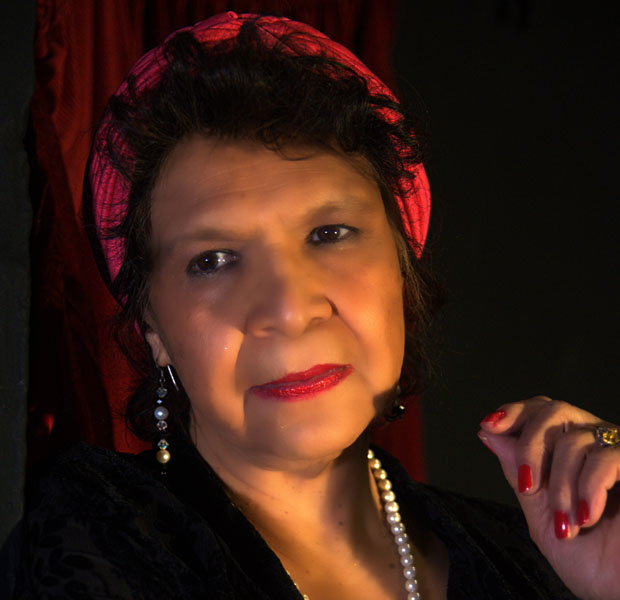For Colored Girls Tony Winner Trezana Beverley on Playing Mabel Mercer in Her New Solo Play

(© Tanja Productions)
Mabel Madness, a solo show about the life of cabaret chanteuse Mabel Mercer, begins its world premiere at Urban Stages on February 19. Tony Award winner Trezana Beverley (For Colored Girls Who Have Considered Suicide/When the Rainbow Is Enuf) serves as both playwright and star of what has become her latest passion project. Read here as Beverley explains her journey with the piece, through which she has discovered Mercer's unusual personal history as well as her lasting impact on African-American musical culture.
It was about seven years ago when my singing coach, Mr. Ken Hanson, said, "You should do Mabel Mercer." I didn't know who she was, but it wasn't long before Ken had arranged for us to take a trip to the Schomburg Center for Research in Black Culture in Harlem. There, I began my journey with this remarkable lady through countless pictures and articles. A few years later, while having a conversation with David Hammond, who was artistic director of PlayMakers Repertory Co. in Chapel Hill, North Carolina, I discovered that he, too, was a tremendous fan of Mabel Mercer. He made a point of seeing her on every visit he made to New York as a young man. When I told David that I wanted to do a one-woman show about her, he was elated and recorded several CDs of her singing for me. It seemed like I even sounded a bit like her when I sang some of the popular songs she was famous for.
Very few younger Americans know the legacy of Mabel Mercer and her contribution to contemporary singing styles. In the '40s and '50s, she was the "Judy Garland of cabaret." If you came to New York, you had to hear Mabel Mercer. It was quite rare for a British woman of a mixed-race background to sing in the clubs and be a hit. She spoke the "Queen's English" and sat in a chair when she sang. How all of this came about is the plot of my play. Mabel was abandoned by her white mother. And she never knew her black father. She was raised in a nunnery. She made her living singing and dancing in the early music halls of London and Europe. And eventually became the toast of "café society" both in Paris and New York.
I believe Ms. Mercer's success was largely due to her inner strength and her unshakable faith in the face of opposition. It was well known and quite accepted by everyone who knew her that she was a religious woman. She went to mass every day. How did such a lady become so respected in a profession that all but shuns such sensibilities? I prefer not to call myself "religious," but people who know me know that I am a firm believer in God. And, like Ms. Mercer, I go to church. I know my faith has enabled me to endure the many challenges of a life in the theater. I would not want to live without faith. I also know what it's like to be different. I am a very fair-skinned woman. Some people thought I was a white girl when I performed in Colored Girls. At that time it was extremely hard for African-American actresses to get work if your complexion landed on either extreme of the color spectrum.
I also know what it means to have a personal vision for your life and to have your steps divinely ordered. Mabel's lifelong friend, Marlene Dietrich, and her lover-girlfriend, Jo Carstairs, the rich oil heiress, bought her a ticket on the Queen Mary to help her escape the Nazi invasion of France. If she had never come to Americ,a such great popular singers like Frank Sinatra, Tony Bennett, Barbara Cook, and Billie Holiday would never have had the opportunity to study her unique way of singing and incorporate it into their personal singing styles.
Mabel Mercer was the master of "story song." She personalized every image. I'm sure this was because she was an actress in her soul. She always wanted to play Julie, in Show Boat. But, mulatto women were never cast as their true selves, and by the time she got to America and had gained a reputation, she was said to be too old for the role. Ironically, "Show Boat" was also my first legitimate play. I also wanted to play Julie. Frank Sinatra said that he owed everything he knew about phrasing to Mabel Mercer. He was largely responsible for her receiving the Presidential Medal of Freedom in 1983.
Every step I've taken forward in the advancement of Mabel Madness has been divinely ordered. Nothing is by accident. Now, Frances Hill is producing my play at Urban Stages, and directing it in collaboration with the wonderful lyricist and director Peter Napolitano. Mabel Madness is a story of hope. It is a story of endurance and love. I am deeply grateful to all of the people who have forwarded me on this journey. And I am mostly grateful to God's spirit that I share with Mabel.










